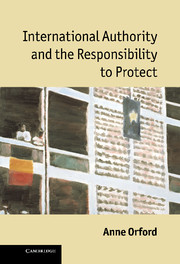Book contents
- Frontmatter
- Contents
- Acknowledgements
- 1 Protection in the Shadow of Empire
- 2 Practices of Protection: From the Parliament of Man to International Executive Rule
- 3 How to Recognise Lawful Authority: Hobbes, Schmitt and the Responsibility to Protect
- 4 Who Decides? Who Interprets?: Jurisdiction, Recognition and the Institutionalisation of Protection
- 5 The Question of Status and the Subject of Protection
- Bibliography
- Index
- References
3 - How to Recognise Lawful Authority: Hobbes, Schmitt and the Responsibility to Protect
Published online by Cambridge University Press: 04 February 2011
- Frontmatter
- Contents
- Acknowledgements
- 1 Protection in the Shadow of Empire
- 2 Practices of Protection: From the Parliament of Man to International Executive Rule
- 3 How to Recognise Lawful Authority: Hobbes, Schmitt and the Responsibility to Protect
- 4 Who Decides? Who Interprets?: Jurisdiction, Recognition and the Institutionalisation of Protection
- 5 The Question of Status and the Subject of Protection
- Bibliography
- Index
- References
Summary
Civil war and the turn to protection
This chapter explores the implications of the basic claim at the heart of the responsibility to protect concept – that the authority of states and of the international community is grounded on the capacity to provide protection. During his tenure as Secretary-General, Dag Hammarskjöld transformed the UN into an instrument of executive action in order to fill the dangerous ‘power vacuums’ that were arising as the colonial system was being ‘liquidated’. The responsibility to protect concept has sought to consolidate and rationalise those practices of executive action as a response to the challenge of creating political order in situations of ‘internal war, insurgency, repression or state failure’. In that sense, the responsibility to protect concept can be seen as part of a long tradition of political thought that has sought to explain how to distinguish between competing claimants to authority during times of civil war or revolution. In particular, the turn to protection as the solution to the problem of civil war was championed by two political and legal theorists who wrote during periods of civil war and revolution in Europe – Thomas Hobbes and Carl Schmitt. Both Hobbes and Schmitt argued that the capacity to guarantee protection grounds lawful authority. The tendency of their arguments to support an agenda that is at once revolutionary and authoritarian gives a sense of the potential promises and dangers inherent in the linking of authority, responsibility and protection.
- Type
- Chapter
- Information
- International Authority and the Responsibility to Protect , pp. 109 - 138Publisher: Cambridge University PressPrint publication year: 2011



